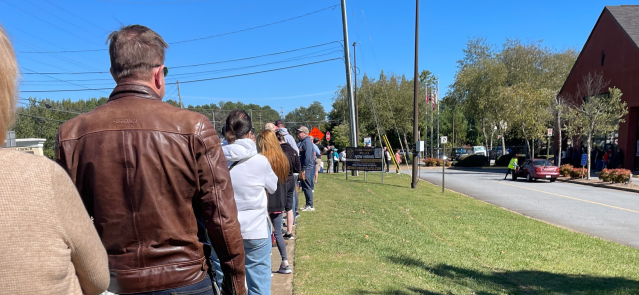Stay ahead of the curve as a political insider with deep policy analysis, daily briefings and policy-shaping tools.
Request a DemoThe Winners and Losers of Georgia’s New Political Maps

House Speaker David Ralston calls to order the ...
- Redistricting determines the political future of the state but also how federal and state funds are allocated to your community.
- GOP likely to lose a few seats but retain a strong majority in Georgia House and Senate.
- Democrats likely to lose a member in U.S. Congress that will narrow control of U.S. House of Representatives.
- Splitting of certain minority communities and cities raises questions about gerrymandering.
Redistricting, the once-in-a-decade ritual that wrapped up this week in Georgia, may seem like political insider-baseball, and even the name might make your eyes glaze over. But the process, beset by accusations of gerrymandering and a lack of transparency, is hugely important: it determines the political future of your state, county and city for years to come and affects how state and federal funds will reach your community.
For the 750,000 suburban Atlanta residents of the 6th Congressional District, it means they will lose their two-term Democratic U.S. Rep. Lucy McBath as their voice in Washington D.C. Meanwhile, for conservative voters in the Georgia House district south of Atlanta held by state Rep. Philip Singleton (R-Sharpsburg), it means losing a far-right voice in the state Capitol. For some minority communities and cities in various areas of the state, new district lines – intentionally or inevitably – break up voting blocks, reducing those voters’ influence on election outcomes. These are just some of the impacts from the work lawmakers did this month.
In the Peach State, like most states, the process of redrawing the maps for the house, senate and congressional districts is controlled by the party that controls the legislature. As a result, Georgia’s new maps make it likely the state’s majority-party Republicans will keep their advantage in the Georgia Senate and House of Representatives, while also seizing back control of a metro Atlanta congressional district that Democrats flipped three years ago. The predictable results of a roughly three-week special session to redraw the maps drew cries of “gerrymandering” from minority-party Democrats and some political analysts, who see deep problems with a district-setting process that largely lets the majority party call the shots.
“Knowing how elections will come out before the first vote is cast in many local elections is one of the biggest problems facing our democracy,” said Eric Segall, a constitutional law professor at Georgia State University.

Georgia House Speaker David Ralston, a Republican, discusses the new legislative and congressional maps during the 2021 special session on redistricting. (Credit: Alessandro Marazzi Sassoon for State Affairs)
Top Republican lawmakers defended their redistricting moves at every turn, noting the new maps had to square with population changes from the 2020 Census and meet anti-discrimination standards set in the federal Voting Rights Act. Map-drafters in the General Assembly also leaned on help from an internal legislative office that drafted new district lines before lawmakers haggled over the finished product – though that process drew transparency concerns over exactly who had a hand in creating the maps.
“Through an inclusive, exhaustive and transparent process, we have produced a fair and equitable map representative of Georgia’s changing demographics and shifting population centers that is in full compliance with the spirit and letter of the law,” said Georgia House Speaker David Ralston (R-Blue Ridge), the General Assembly’s most powerful member.
In this story, State Affairs breaks down the big takeaways from redistricting to track the likely winners and losers of Georgia’s redrawn political maps.

Members of the the public attend a committee hearing on Georgia’s new House maps at a committee hearing during during the 2021 special session on redistricting. (Credit: Alessandro Marazzi Sassoon for State Affairs)
The Winners
The new legislative and congressional maps should give Georgia Republican incumbents and candidates a solid advantage long into the future, according to political analysts. In the House they did so even while sacrificing some Republican-held seats in more toss-up areas, such as by merging seats held by Democratic Rep. Winfred Dukes (D-Albany) and Republican Rep. Gerald Greene (R-Cuthbert) into a new Southwest Georgia district that will lean slightly Democratic.
“Republicans essentially are taking a conservative stance,” said Charles Bullock, a political science professor at the University of Georgia. “They’re giving up some now in hopes of what they set aside for themselves for ten years.”

Republican state Sen. John Kennedy (right) speaks with Democratic state Sen. Michael “Doc” Rhett (left) during the 2021 special session on redistricting. (Credit: Alessandro Marazzi Sassoon for State Affairs)
Georgia’s population has grown by more than a million people over the past decade, ushering in different voting patterns that have turned Georgia into a swing state split roughly in half between Republican and Democratic voters. However, should Democratic candidates win every General Assembly swing seat next year, Republican lawmakers would still hold a comfortable lead in both the state House and Senate, an analysis of voter data from recent elections shows. Still, top Republican lawmakers batted back claims of gerrymandering and stressed the need to reshuffle district boundaries due to population changes, rather than partisan aims.
“That’s what really drives redistricting, to meet the new population requirements with limited changes,” state Sen. John Kennedy (R-Macon), who chaired the Senate’s redistricting committee, told State Affairs. “It does get political, but they’re not our districts. We don’t own them.”
Ralston, the House speaker, also secured a win over opponent lawmakers from within his own party, including Singleton (R-Sharpsburg), who bashed Ralston during his successful campaign for a suburban Atlanta-area seat last year. The new map redraws Singleton’s district into a Democratic-leaning zone.

Republican state Rep. Philip Singleton gives his opinion on Georgia’s new house maps at a committee hearing during the 2021 special session on redistricting. (Credit: Alessandro Marazzi Sassoon for State Affairs)
The Losers
Georgia incumbents in the rapidly changing Atlanta suburbs took the toughest hits from the new district maps. Most especially, the Republican-led maps set the stage for McBath to lose her 6th congressional seat north of Atlanta, spanning parts of Cobb, Fulton and DeKalb counties. McBath’s win in 2018 flipped a Republican stronghold amid shifting voter demographics that handed Democrats an edge and previewed victories for President Joe Biden and U.S. Sens. Jon Ossoff and Raphael Warnock – all Democrats – in the 2020 elections.
“That district looks to us like that has been targeted,” said Ken Lawler, a former Democratic state lawmaker who chairs the nonprofit Fair Districts Georgia that advocates against gerrymandering. “Obviously, this map is engineered to create a very safe sixth district from a Republican point of view.”

The 6th Congressional District has been redrawn to include less Democratic-leaning parts of metro Atlanta and more rural Republican strongholds to the north. (Credit: City University of New York “Redistricting and You” project)
The new congressional map will shift McBath’s district boundaries northward, replacing diverse urban and suburban voters with more white rural voters. That move looks to favor Republican candidates by double digit margins, observers say. While Biden carried 55.7% of votes to Republican former President Donald Trump’s 44.3% share in the sixth district last year, the new boundaries would roughly reverse that tally to a count of 57.8% for Trump and 42.2% for Biden. All told, McBath’s redrawn district gives Georgia Republicans a good shot at upping their congressional seats to 9 out of 14 in next year’s midterm elections, weakening Democrats’ current 221-to-213 seat majority in the chamber. Before the session concluded, McBath announced she will run instead in the more democratic 7th Congressional District, challenging fellow Democratic U.S. Rep. Carolyn Bourdeaux.
Similar changes to the General Assembly’s district maps aim to consolidate power for Republicans, who have controlled both the state House and Senate since 2005. Democratic Reps. Shelly Hutchinson (D-Snellville) and Rebecca Mitchell (D-Snellville) saw their separate districts redrawn into a single district. Democratic Sen. Michelle Au (D-Johns Creek) also faces drastic changes to her district, which will shift to a majority-white composition after years of growth among Asian American voters.

Democratic state Sen. Michelle Au’s district has changed from a majority-minority district to a majority-white district. (Credit: City University of New York “Redistricting and You” project)
Why They Say Georgia is Gerrymandered
While it’s too early to say if this year’s maps will draw legal challenges, they did score relatively poor marks from Princeton University’s Gerrymandering Project statistical analysis.
“An ideal map would be one that has a reasonable amount of competitiveness, because we know that competitive districts lend themselves to responsiveness amongst the elected officials,” said Adam Podowitz-Thomas, senior legal strategist for the Princeton Gerrymandering Project. “If they have to fear they’re going to lose their elections, they’re much more likely to listen to their constituents.”
Podowitz-Thomas highlighted how revisions to metro Atlanta House districts resemble a thinly-sliced pizza pie as a prime example of using odd voter geographic configurations drawn to create heavily Democratic districts, at the expense of communities or neighborhoods with shared identities having their concerns represented. That has the effect of siphoning off Democratic voters from otherwise more purple suburban districts, he said.

New district lines split some Georgia cities such as Macon and Athens that critics say were unnecessarily divided. (Credit: City University of New York “Redistricting and You” project)
“Redistricting has tremendous implications for all the other issues that a legislature or Congress takes up and if political outcomes are predetermined – and that’s what gerrymandering seeks to do – what it means is that elected officials as a general matter are far less responsive to their constituents, and public opinion matters a whole lot less,” said Yurij Rudensky, the redistricting counsel for the Brennan Center for Justice, a group which advocates for states to legislate that redistricting be done by independent non-politician commissions. Arizona, Alaska, Colorado, Michigan, Idaho, Montana, Washington, Oregon, California and Hawaii do so to varying degrees.
“With gerrymandering, because the communities and the people are secondary, and partisan considerations are first and foremost, the issue is that districts often combine people and communities that don’t actually have much in common,” Rudensky said.
Examples of split communities that became the focus of debate during Georgia’s special session included carving up cities like Athens, Macon, Lawrenceville and Columbus. There was also concern about racial communities having their vote diluted. Notably, the Black voting population in Henry County around McDonough saw their vote split across three Senate districts.

Critics of the new maps point to places such as Henry County where the Black-majority population in McDonough (shaded here in orange) has been split three different ways. (Credit: City University of New York “Redistricting and You” project)
A Transparent Process?
Georgia’s maps sped through the General Assembly in less than three weeks this month, drawing charges that the process was inaccessible and lacked transparency. Republicans, who revealed their proposed maps sometimes just hours before presenting them, responded to those accusations by citing that they had held numerous public hearings and were open to input from Democrats.
“Yes, Georgians have requested transparency, and yes, we have given them transparency,” said state Rep. Bonnie Rich (R-Suwanee), who chairs the House redistricting committee.

Members of the Georgia House of Representatives meet during the 2021 special session on redistricting. (Credit: Alessandro Marazzi Sassoon for State Affairs)
State Sen. Elena Parent (D-Atlanta) said her emails to Republican lawmakers seeking information on which non-legislative groups had access to help draft the maps went unanswered. A Georgia House Democratic Caucus official also told State Affairs they didn’t learn about the involvement of a University of Texas political-science professor who conducted a “racially polarized voter analysis” of the House map, until deep into the approval process. The professor, Tom Brunell, did not respond to State Affairs’ request for an interview to discuss his involvement.
“Georgians asked for a clear explanation of why the district lines were drawn and how they were drawn,” said state Rep. Erick Allen (D-Smyrna). “But all we heard was mostly obfuscation regarding the most critical and contentious districts.”
To create the maps, the General Assembly’s nonpartisan Legislative and Congressional Reapportionment Office used a software called Maptitude for Redistricting that state legislatures in most other states also use, said the office’s executive director, Gina Wright. She declined to give details on what input individual lawmakers or groups had on the process, citing confidentiality.
“We are happy to provide assistance to any member at any time as we are available,” Wright said in an email to State Affairs. “As such, I have confidentiality with all members of the [General Assembly] and do not disclose the process of what they work on with us.”
Beau Evans contributed reporting to this story.
What questions do you have about Georgia’s redistricting? Let us know your thoughts and questions: [email protected].
2 young Democrats win Statehouse seats as Republicans hold majority
ATLANTA — Many Statehouse incumbents appeared to beat back challengers Tuesday, ensuring their return to the Capitol in January. Republicans retain control of the House and Senate. Two Generation Z candidates will join the 236-member Legislature as new members of the House of Representatives: Democrats Bryce Berry and Gabriel Sanchez. Berry, a 22-year-old Atlanta middle …
Election night 2024: What to watch for as the results roll in
It’s been a long time coming, but we’ve finally made it to Election Day 2024. Today’s most anticipated race is, of course, the presidential contest between Vice President Kamala Harris and former President Donald Trump. The pair have spent a combined $25 million in new media ads alone in the past two weeks in this …
Election Day 2024: State Affairs brings you the fair, transparent, nonpartisan coverage you deserve
Election Day is here and State Affairs stands ready to bring you the kind of election coverage you deserve — fair, transparent and rooted in a commitment to nonpartisanship. Across the states, voters are casting their ballots, deciding on leaders and policies that will shape our communities and futures. And as the results come in, …
Election Day is finally here. Take a deep breath and take these 8 tips to the polls
After months of political derision and trash talk, the 2024 general election is upon us. If you couldn’t squeeze in time to vote early during the past three weeks, State Affairs will get you through Tuesday’s election line. Keep these eight tips in mind: Have questions, comments or tips? Contact Tammy Joyner on X @lvjoyner …




